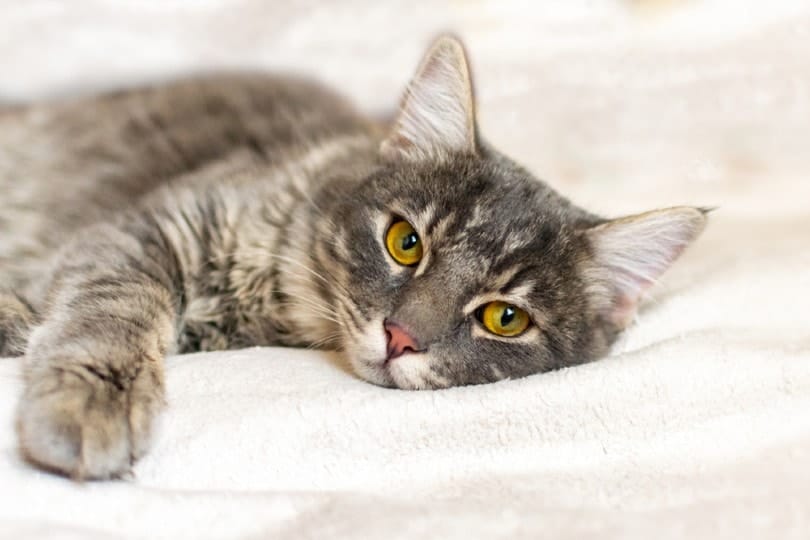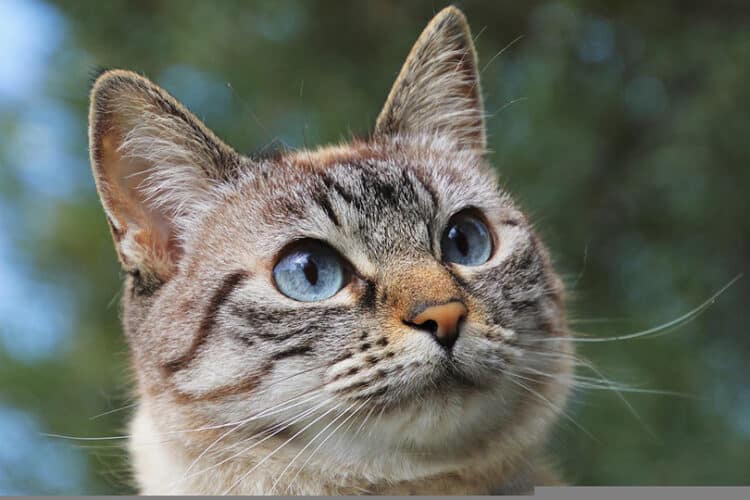Nothing beats cuddling with your cat at the end of the day, especially on cold days when they’re just like fluffy hot-water bottles. But while their body temperature is, on average, a few degrees higher than ours, cats can get cold too.
A cat’s ears are the most likely appendage to get cold on occasion, and the reasons range from benign to severe. Being able to determine the cause of your cat’s cold ears will help you decide whether veterinary assistance is required or if your cat just needs more cuddles to warm up.
The 5 Reasons Why Cats Ears Are Cold?
1. Anxiety
Stress affects everyone in weird ways, and cats can show odd symptoms when they’re feeling anxious about something. Cold ears are one sign that they’re not feeling comfortable or something has upset them. This can be due to a new environment if you’ve recently moved to a new house or somebody they don’t know is in the home.
To lessen your cat’s anxiety, reassure them that everything’s okay by giving them time to adjust. Reassuring them with a familiar, stable routine and their favorite toys and blankets can also help them settle down.

2. Behavior
Cold ears don’t always indicate an underlying health issue. Sometimes, it’s simply a result of your cat’s behavior. If you notice that they’ve got cold ears while they’re curled up on your lap or sleeping, it could simply be due to a reduced blood flow.
Whenever your cat sits still for long enough, their bodies adjust to reduce their metabolism and heat production to preserve energy for later. Chilly ears, in this case, are completely normal and nothing to worry about.
3. Frostbite
When a person is exposed to freezing conditions, they can get frostbite, which is caused by the blood vessels in the colder areas of the body constricting to keep the blood flow concentrated in the core. This keeps the body’s core temperature stable, with the downside of leaving the extremities at risk of freezing due to the reduced blood flow.
Cats are great at regulating their body heat, but even they aren’t immune to extreme temperatures. If they spend enough time outside, especially in winter, they can develop frostbite. Their ears, along with their paws and tail, are the most susceptible to suffering from frostbite.
Frostbite requires a trip to the veterinarian and can be recognized by these symptoms:
- Black or dead skin
- Blisters
- Coldness
- Pale, gray, or bluish skin
- Pain
- Swelling

4. Hypothermia
While frostbite affects the extremities, hypothermia is a result of the body’s core temperature dropping below normal, which is 95 degrees F (35 degrees C) for a cat. Cats that spend too much time out in the cold or suffer from metabolic dysfunction, such as hypothyroidism or hypoglycemia, are at risk of developing hypothermia. It’s a result of your cat’s body losing heat faster than it can produce it.
Cold ears can be a sign that your cat’s core body temperature is too low, and you should double-check with a rectal thermometer. Hypothermia needs to be treated as quickly as possible and requires carefully warming up your cat with blankets, warm water bottles, and sometimes warm fluids. Serious cases may require a trip to your veterinarian.
5. Weather
Although cold ears can often be a sign of a serious health issue, your cat can simply just be chilly because they got caught in the rain during their outdoor adventure. This can quickly lead to frostbite or hypothermia if it’s too cold, but typically, your cat only needs a cuddle to warm up again.
If their favorite napping spot is in a draft, this can also make it easy for them to get too cold even if they’re safe indoors.
Your cat will often stay inside on cold days. If they’re caught out while they’re adventuring, they’ll likely be happy to steal your lap for a quick nap or curl up by the fire.

Final Thoughts
Most of the time, cats are good at managing their own temperature. They’re not immune to the effects of the cold, though, and sometimes, they need extra help to warm up. Your cat’s ears might be cold because they’re feeling anxious or were out in cold weather. It can also be the result of a serious issue like frostbite or hypothermia.
Featured Image Credit: Pixabay
















